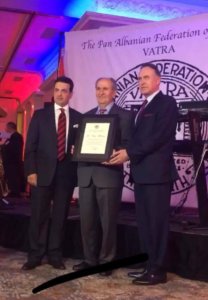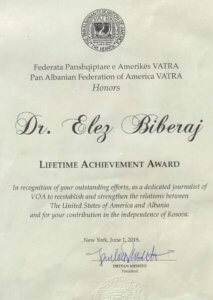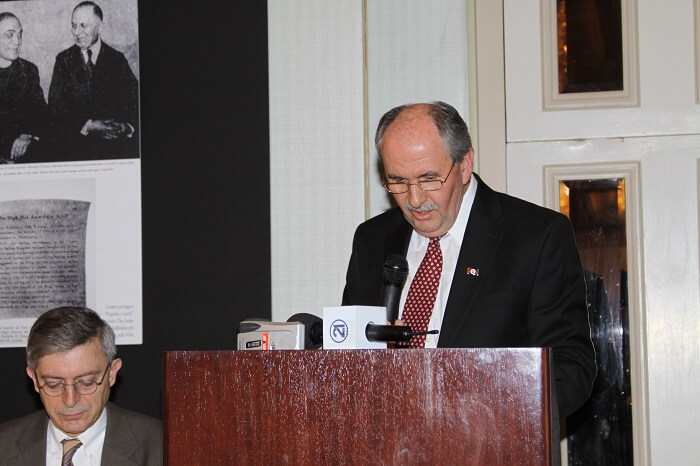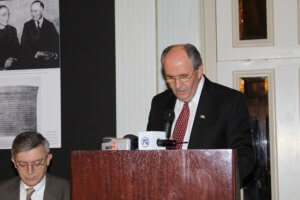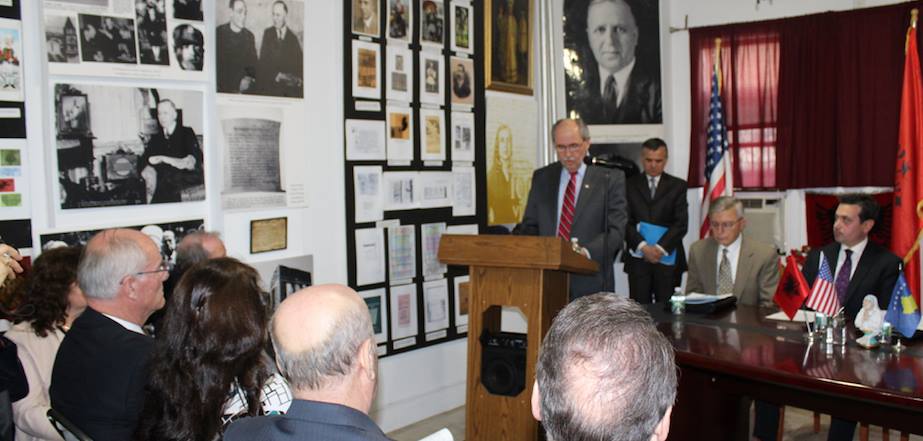
By Dr. Elez Biberaj/
It is my honor and privilege to participate in the book promotion of my friend and colleague, Fran Shkreli, who has given and continues to give a valuable contribution in the Albanian journalistic landscape, in general, and the advancement of Albanian issues, in particular.
I am very happy to be here at our VATRA and in the company of well-known personalities, friends and colleagues. I would like to express my gratitude to VATRA for the care that it has always shown and continues to show in promoting the works of the members of our community.
Before talking about Fran’s book, I would like to acknowledge the close ties that have historically existed between Voice of America and VATRA, going back to the difficult years of the Cold War years to this day. Voice of America has always aimed to cover the activities and services of the Albanian-American organizations and associations, especially those of VATRA.
The Voice of America archives contain a number of broadcast recordings of events, meetings, and high-profile personalities of our community. The collection includes Fan Noli’s speeches, which, through VATRA, were donated to the National Library in Tirana. Prominent journalists of Voice of America have played an important role in VATRA and Dielli – Xhevat Kallajxhiu, Idriz Lamaj, Gjek Gjonlekaj, and others. Some of us, including me, have published our first stories in the newspaper Dielli.
Frank Shkreli has a long, outstanding and fulfilling career. Throughout his work, he has been a staunch defender of free speech and freedom of the press, human rights, and an advocate for the Albanian issue.
Frank Shkreli’s media related career extends nearly five decades. It began shortly after his immigration to the United States and the college years. Initially, he focused his attention on Albanian topics – the challenges facing our Albanian-American community as well as Albanians in their homeland.
Having distinguished himself in this field, Frank broadens his scope to include regional and global issues of importance. He acquired extensive knowledge on international relations, in general, and the former communist bloc, in particular. Frank is equipped with comprehensive political awareness and has vast insights into the US foreign policy including the politics of Washington.
Frank has the ability to examine and analyze current regional and international issues. After retirement, he made a 360-degree turn to go back where he started his activity, focusing once again on issues and developments concerning Albanians.
This is reflected in his comprehensive campaign to raise awareness in the United States on the situation, the demands and aspirations of Albanians, the establishment of democracy in the Albanian territories, and the development of inclusive democratic societies.
The outcome of his work is the book presented here, Demokracia Nuk Pret! In his writings, especially the ones featured in this publication, Frank examines issues, events and subjects of a wide variety with honesty and objectivity. He covers themes from our past – the positive and negative aspects, the pains and joys – as well as contemporary issues. He analyzes it all critically yet always draws a constructive conclusion that could benefit the Albanian decision-makers in confronting the current strategic and diplomatic challenges. In his articles, he makes a strong case for Albanians to consolidate their Western orientation.
What is the importance of Fran Shkreli’s writings? What does he offer to the reader at a time when the Albanian media landscape has expanded and changed dramatically?
As a professional journalist and analyst, his greatest asset is the high level of credibility that the reader has assigned to him thanks to his ability to be objective and balanced. Frank is aware that while journalists today have abundant opportunities and sophisticated tools, the mission of news reporting is always to tell the truth even when it is bitter. He has always been in search of the truth.
With respect to the readers, Frank’s point of view is that of a well-known Albanian-American media professional who is deeply invested in consolidating Albanian democracy and solidifying the strategic partnership between Albanians and the United States. He reminds Albanians that these relations should be continually fostered and a stronger partnership depends on the Albanians’ embracing of democratic values: respect for human rights, the rule of law, a strong and accountable governance.
In this regard, I believe Frank reflects the views and hopes of our community for a more righteous and democratic society in the Albanian territories.
Demokracia Nuk Pret is an important reference for journalists, students, scholars and politicians. Frank Shkreli’s book offers an important insight into the Albanian political and media debate. The tone and content of his writings are unique in the Albanian media landscape.
The timing of the publication is appropriate and relevant.
Albanians, in Albania, Kosovo, Macedonia, and elsewhere, should rightfully be proud of their accomplishments in the last quarter century. This week, Albania received very good news from Brussels, the recommendation for launching membership talks in the European Union.
However, as Frank points out in his book, Albanians cannot be content with the current political, economic, and social status.
While Brussels’ recommendation is hopeful, it presents a crucial point for the governing elites, not only in Albania, but also in Kosovo and Macedonia, to reflect on what I would call golden opportunities that Albanians have missed over the last years and even decades, which have slowed down their pace towards a stronger democracy. The accession talks in the European Union should have started years ago. It should be acknowledged that this chance and other golden possibilities for Albania and Kosovo are largely lost as a result of the flagrant lack of leadership by the Albanian decision-makers.
Today, Albanians face significant challenges: economic problems; high unemployment and poverty; corruption at all levels of government and society; illegal practices and the absence of the rule of law; weak institutions; irresponsible politicians who tolerate and attract corruption and use undemocratic practices to secure and retain power.
These domestic challenges are exacerbated by issues in the international arena: the erosion of democracy regionally and globally; the empowerment of authoritarian alternatives in Turkey and in Russia; and the shifting of the Balkan and European political landscape.
Meanwhile, the major Western players are showing signs of fatigue with the Albanians, who continue to generate crises, which require attention and resources. These negative international trends can undermine the positions of Albanians and cause a deterioration in their political and economic progress.
Today there is no talk of a dynamic or certainty of reforms in Albanian territories. Instead, there is stagnation, sluggishness, general decline, loss of hope, and extreme political polarization, with dangerous consequences for the future.
If something does not change soon, these negative trends will hamper the efforts of Albanians to position themselves decidedly in the family of Western democratic countries and societies.
In order to disrupt this general downturn, Albanians must undertake radical changes that would result not only in taking a new direction but would bring about a serious transformation of the Albanian society.
In order to achieve these goals, it is imperative that:
- The current style of governance changes fundamentally and focuses on principal national interests rather than the intentions of political parties or short-term political objectives.
- The main political forces agree on a vision for the future of the country and on the compilation and implementation of major policies that will lead towards this vision.
- The establishment and promotion of truly independent institutions that are capable of establishing the rule of law and driving out corruption.
- The freedom of media from the pressure of political and financial interests.
- The decision-making process on key issues to be inclusive, thus ensuring the participation of main actors, interest groups, civil society, and experts.
- And finally, the whole society needs to undergo a total transformation in the ways it thinks and acts. Albanians should be more demanding and hold their politicians liable by seeking greater accountability, transparency and responsibility.
These are very challenging objectives which require political will and time.
Albanians in general, not just their leaders and politicians, face a historic test: to accept the current situation or to wake up from stagnation, seize the moment and take the necessary steps towards the fulfillment of their democratic potential.
